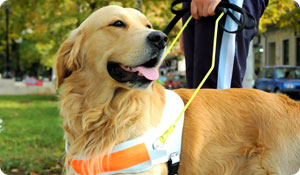
You may have heard stories about someone's four-legged companion saving his life by alerting him to an impending health crisis, such as an epileptic seizure or heart attack. Dogs may be man's best friend in cancer detection as well. In several different studies, dogs have detected cancer at a high rate of accuracy.
In a well-publicized double-blind experiment in 2006, dogs distinguished lung and breast cancer patients from healthy controls. In a 2008 study, dogs not only detected ovarian cancer, they differentiated ovarian cancer from other gynecological malignancies. The canines were equally successful in detecting early and late stage ovarian cancer.
Most recently, a study published in the journal Gut reported that dogs were about 95 percent accurate in detecting colon cancer from breath samples and 98 percent accurate in detecting colon cancer from stool samples. Their success rate was highest in people who had early stage cancer. Smoking and other gastrointestinal issues did not interfere in the dogs' ability to detect cancer.
So, is it time for your pooch to apply to medical school?
Since dogs have highly tuned olfactory abilities and far more smell nerves than humans do, it's not surprising they can smell cancer-emitting odors. After all, we use dogs for other scent-related tasks, such as hunting and tracking, search and rescue, and for detecting drugs and explosives. While it's not likely that you'll see dogs in the examining room any time soon, the idea of using odor as a diagnostic tool is gaining traction.
Oncologists know that cancers produce biomarkers, or physiological changes, they can measure in patients' urine, blood, or exhaled breath. These biomarkers are useful as a complementary tool for detecting and diagnosing cancer. Further, malignant tumors exude tiny amounts of volatile organic compounds (VOCs). We have roughly 200 VOCs in a single breath sample, although some VOCs, such as alkanes (which result from oxidative stress), are not present in healthy tissue. Oncologists are already using VOCs as tumor markers in lung cancer.
Scientists need to identify which chemical compounds among the many most accurately identify the presence of cancer. While physicians currently use diagnostic sniffing tools to help ferret out disease states, these manmade tools can't yet detect many of the telltale chemicals. Researchers are working to develop detection tools that are better able to identify cancer-specific compounds.
Sources:
Johnson, David A., MD. "The Nose Knows: Dog Sniffs Out Colon Cancer." Medscape Medical News. Web. 10 February 2011. http://www.medscape.com/viewarticle/737130
Chustecka, Zosia. " Dog Sniffing Out Cancer May Lead to Early Detection Test." Gut. Medscape Medical News. Web. 31 January 2011.
http://www.medscape.com/viewarticle/736558
Phillips, Michael, MD, Cataneo, Renee N., MA, Cummin, Andrew R.C., DM, Gagliardi, Anthony J., MD, FCCP, Gleeson, Kevin, MD, Greenberg, Joel, BS, Maxfield, Roger A., MD, FCCP, and Rom, William N., MD, MPH, FCCP. "Detection of Lung Cancer With Volatile Markers in the Breath." CHEST 123(6) (2003). Medscape Medical News. Web. 27 June 2003.
http://www.medscape.com/viewarticle/457244
Nelson, Roxanne. "Smelling' Skin Cancer: A Potential Tool for Detection and Diagnosis." Medscape Medical News. Web. 21 August 2008. http://www.medscape.com/viewarticle/579408
Tachibana, Chris. "Can dogs smell disease in humans?" Research Penn State. Web. 13 April 2010.
http://www.rps.psu.edu/probing/sniffing.html
McCulloch, Michael, Jezierski, Tadeusz, Broffman, Michael, Hubbard, Alan, Turner, Kirk, and Janecki, Teresa. "Diagnostic Accuracy of Canine Scent Detection in Early- and Late-Stage Lung and Breast Cancers." Integrative Cancer Therapies 5(1) (2006): 30-39. Web.
http://ict.sagepub.com/content/5/1/30.full.pdf+html





